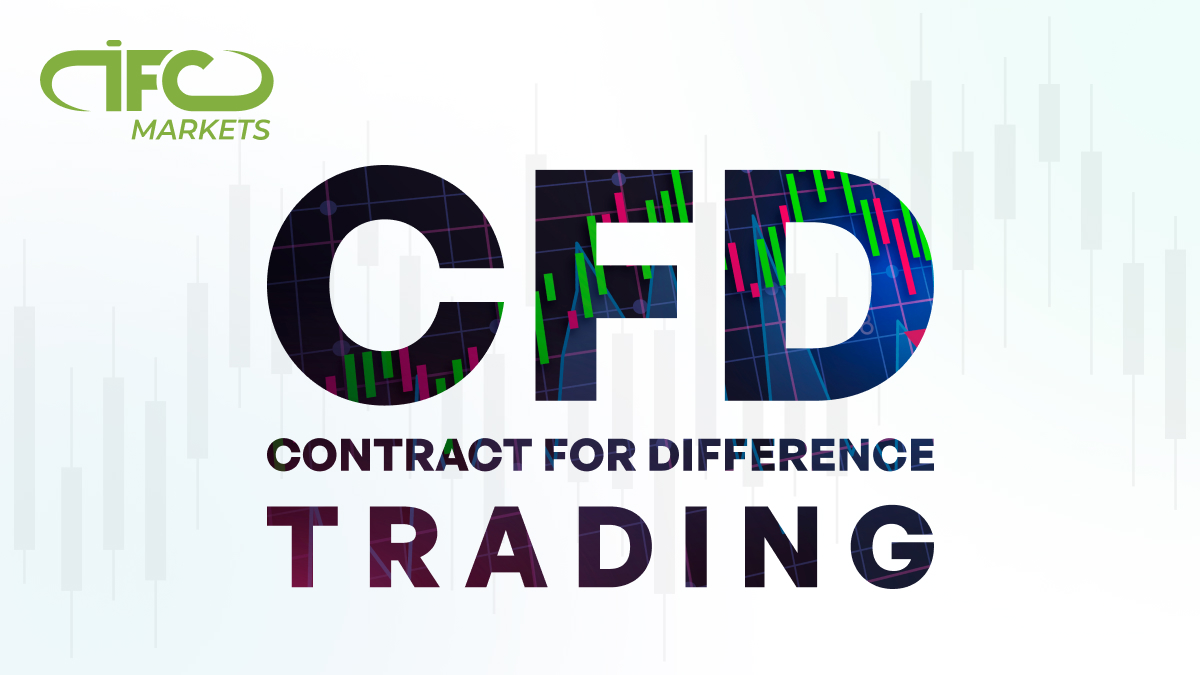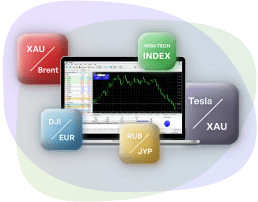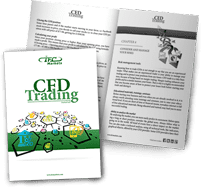- Education
- Trading CFDs
Trading CFDs - Benefits of CFD Trading
CFD (Contract for Difference) is a contract between two parties known as "buyer" and "seller" to exchange the difference between opening and closing prices of the contract. The popularity of the instrument mainly stems of a simple fact that investors do not have to obtain the physical assets for trading them. Observations have proven that significant number of traders prefer CFD trading over other financial instruments.

Benefits of CFD Trading
- Leverage
- Pay Less Tax
- Access DMA
- Profit from Both Rising and Falling Markets
- Access a Wide Range of Markets
- Hedging Your Existing Portfolio
CFD is a complex financial instrument, but they also offer unique advantages for experienced traders. We will explore the benefits of CFD trading, so you can decide if they're a good fit for your investment strategy.
We'll break down how CFDs work and the different markets you can access through CFD trading. We'll also cover some of the key benefits like leverage, tax advantages, and the ability to profit from both rising and falling markets. But remember, CFD trading isn't without risks, so we'll also discuss the importance of managing risk and using CFDs responsibly.
Main Benefits of CFD Trading
CFD trading, or Contract for Difference trading, is a way to speculate on the price movements of financial assets without actually owning those assets.
CFDs are contracts between you and a broker. You agree to exchange the difference in the price of an asset from when you enter the contract (open) to when you exit (close). CFDs can be based on various things like stocks, indices, commodities, currencies, and even cryptocurrencies. You don't actually own the underlying asset with a CFD. You're just betting on whether its price will go up or down.
It would be a disservice if we didn’t mention that CFD trading is complex and risky.
- CFD trading is for experienced investors who understand the risks involved.
- CFD brokers may charge fees and commissions.
- Leverage can amplify losses as well as gains.
- CFD markets may be less regulated than traditional exchanges.
Now let’s explore the benefits and you will get why so many traders are trading CFDs.
1. Leverage
Leverage is one of the main benefits of CFD trading, but it's also a double-edged sword.
It’s simple, leverage allows you to control a larger position in an asset with a smaller amount of money upfront. This is because you only need to put down a deposit, called a margin, instead of the full value of the position.
Let's say the leverage offered by your broker is 10:1. This means you can control $10 worth of an asset for every $1 you deposit.
Example
Let’s say you believe the price of a stock is going to rise. The stock price is currently $100 per share. Without leverage, if you wanted to buy 100 shares, you would need $10,000 ($100/share * 100 shares). With 10:1 leverage, you would only need to deposit a margin of $1,000 ($10,000 / 10) to control the same 100 shares.
The Magnification Effect
Key point is that your profits (or losses) are based on the full value of the position, not the margin you deposited. So, if the stock price goes up by $5 per share, you would make a profit of $500 (5 shares * $100 price increase). This is a 50% return on your $1,000 margin.
2. Pay Less Tax
There's a common misconception that CFD trading allows you to completely avoid taxes. CFDs have tax advantages compared to traditional share dealing.
- Unlike buying and selling physical shares, CFDs don't incur stamp duty, a tax on stock transactions in some countries.
- Profits from CFD trading are generally taxed as capital gains. However, a key benefit is that you can offset any losses from CFDs against your profits to reduce your taxable income.
Example
You make a $1,000 profit on one CFD trade and a $500 loss on another. Your net profit for tax purposes would be $500 ($1,000 profit - $500 loss).
Important: Taxes on CFDs trading can vary depending on your location and tax regulations.
3 Access DMA
With DMA CFD trading, you get a more direct route to the underlying market compared to standard CFD trading. Instead of the broker acting as a market maker and quoting prices, your orders are routed directly to the exchange order book. This can offer benefits like greater transparency in pricing and potentially tighter spreads (the difference between the buy and sell price of a CFD).
- DMA gives you more control over your order execution, allowing you to specify order types (like limit orders or stop-loss orders) that might not be available in standard CFD trading.
- By accessing the exchange order book directly, you might be able to get better prices on your trades compared to relying on the broker's quotes.
Example
Let’s say you want to buy a CFD on a stock that is currently trading at $100 per share.
- In standard CFD trading, your broker might quote a buy price of $100.10 and a sell price of $99.90 (the spread).
- With DMA CFD trading, you could potentially place a limit order directly on the exchange to buy the CFD at $100.05.
DMA CFD trading is generally for experienced traders who understand exchange order books and order types. Often comes with higher fees or commissions compared to standard CFD trading because you're bypassing some of the broker's services. Potential benefits of DMA (tighter spreads, better prices) need to be weighed against the added complexity and costs.
4. Profit from Both Rising and Falling Markets
One of the key benefits of CFD trading is the ability to profit from both rising and falling markets, unlike traditional share buying. Here's how it works with an example:
Profiting from Rising Markets
This is similar to traditional share trading. You speculate that the price of an asset will go up, so you:
- Buy a CFD contract on the asset.
- If your prediction is correct, the price goes up.
- You then sell the CFD contract at a higher price.
- Your profit is the difference between the buying and selling price.
Profiting from Falling Markets
- You sell a CFD contract on the asset, essentially borrowing the asset from the broker and selling it immediately.
- If your prediction is correct, the price goes down.
- You then buy back the CFD contract to return it to the broker.
- Since you sold at a higher price (before the price fell) and repurchased at a lower price, you make a profit.
Example
Imagine you believe the stock price of Company XYZ is going to fall. The current stock price is $100 per share.
5. Access a Wide Range of Markets
CFD trading platforms are like one-stop shops for your investment needs. Instead of juggling accounts with different brokers for various markets, you can potentially trade everything from currencies (forex) to stocks (shares) and even cryptocurrencies all on a single platform. This means easier management of your investments and no need to transfer funds between accounts to trade different assets.
CFD brokers offer CFDs on a vast array of assets, including:
- Stocks: Trade CFDs on stocks from various countries and sectors.
- Indices: Speculate on the performance of entire stock market indexes.
- Forex (Foreign Exchange): Trade currencies like EUR/USD or GBP/JPY.
- Commodities: Gain exposure to commodities like oil, gold, or coffee.
- Cryptocurrencies: Trade CFDs on Bitcoin, Ethereum, and other popular cryptos (regulations permitting).
6. Hedging Your Existing Portfolio
CFDs can be a valuable tool for hedging your existing portfolio. Hedging is a strategy to reduce the risk of losses in your existing investments. With CFDs, you can take offsetting positions to your current holdings, essentially creating a kind of insurance policy for your portfolio.
If you own a bunch of shares in a tech company (long position) and you're worried about a potential tech stock downturn. You can use CFDs to take a short position on a relevant market. There are two options:
- Shorting the same tech company's CFD: If the stock price falls, you'll lose money on your shares, but you'll profit by closing your short CFD position. These gains can help offset some of your stock losses.
- Shorting a broader tech index CFD: If the entire tech sector weakens, your stocks will likely go down. But by shorting a tech index CFD, you profit from that decline, again helping to hedge your portfolio.
CFD Trading Tips and Strategies
Learn more about CFD Trading
What is CFD Trading - CFD Meaning
The main benefit of CFD trading is being able to speculate on price movements in both directions. Profit from trading CFDs exclusively lies on the trader's ability to correctly predict future price changes. Which is, no doubt, hard.
Why Trade CFDs
CFD trading is perfect due to its unique features and potential benefits. CFDs, or Contract for Difference, are a type of derivative product that allows traders to speculate on the price movements of various financial assets without owning the underlying asset itself.
CFD Markets
In the world of finance and investing, CFD trading has gained immense popularity in recent years. CFD, which stands for Contract for Difference, is a financial instrument that allows traders to speculate on the price movements of various underlying assets without actually owning the assets themselves.
How to Trade CFDs: Learn How to CFD Trade Online
CFDs allow to trade the price movements of global markets and hedge physical portfolios against potential loss of value.
CFDs vs Futures - Difference Between CFD and Futures
If you're new to trading, you may find CFD trading and futures confusingly similar. Both are derivatives that offer leverage benefits, but that's where the similarities end. In fact, there are cases where one may be more suitable than the other.
Gold Instruments
In contrast to traditional gold trading, quoted against the US dollar or the euro, this group includes the following unique instruments, in which gold is quoted against other assets:
Single trading account for trading currency pairs, stocks, commodities, etc.
A single trading account is a set of brokerage services that allow a client to trade on multiple segments of the financial market using only one single account.






